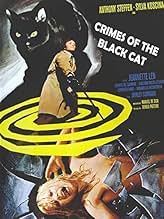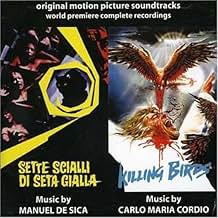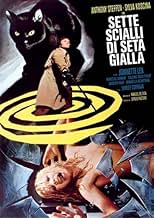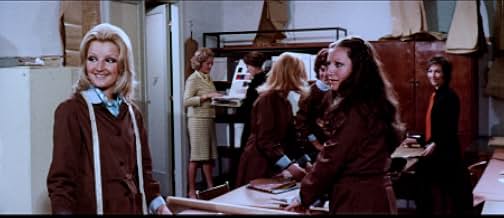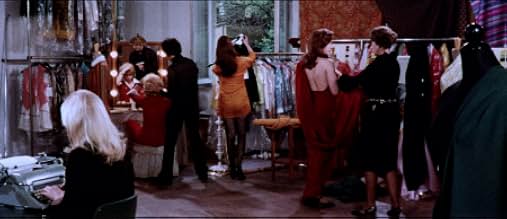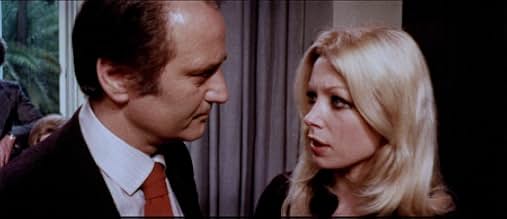IMDb रेटिंग
6.1/10
1.1 हज़ार
आपकी रेटिंग
अपनी भाषा में प्लॉट जोड़ेंA blind pianist overhears a conversation in a nightclub, and is determined to figure out who is responsible for a string of strange murders involving a black cat.A blind pianist overhears a conversation in a nightclub, and is determined to figure out who is responsible for a string of strange murders involving a black cat.A blind pianist overhears a conversation in a nightclub, and is determined to figure out who is responsible for a string of strange murders involving a black cat.
Giovanna Lenzi
- Susan Leclerc
- (as Jeannette Len)
Isabelle Marchall
- Paola Whitney
- (as Isabelle Marchal)
Lorenzo Piani
- Waiter in Hamburg
- (सिर्फ़ क्रेडिट)
Bruno Alias
- Hairdresser
- (बिना क्रेडिट के)
Francesco Anniballi
- Male Nurse
- (बिना क्रेडिट के)
Florinda Bolkan
- Carol Hammond
- (आर्काइव फ़ूटेज)
- (बिना क्रेडिट के)
Margherita Horowitz
- Atelier personnel
- (बिना क्रेडिट के)
फ़ीचर्ड समीक्षाएं
De Sica's below-average score notwithstanding (and they do count a lot in these movies, don't they?) this is a satisfying giallo with all the key elements included and none of them bungled. Granted, a lot of those key elements are ripped right from other movies, and the direct influence of Psycho, Black Belly of the Tarantula, Blood and Black Lace, Lizard in a Woman's Skin and most of all Cat O'Nine Tails doesn't win it points for creativity, but it's all handled as though it were the first film ever made so you don't really mind. The plot, with its typically and gloriously dumb motive for the killings (in this case a car crash in the past, as was the case with Seven Orchids Stained in Blood) moves along at a fair pace, and making the hero blind gives him a sympathetic attraction most giallo heroes lack. It's not as good as any of the films from which it's descended but nevertheless a solid entry in the genre.
"Sette scialli di seta gialla" (Crimes of the black cat) takes place in Copenhagen. The grey subdued skies of Copenhagen and the meditative soundtrack of Manuel de Sica, are a preparation for the giallo we are about to see - a blind pianist, Peter Oliver (Anthony Steffen) investigating a string of murders of fashion models.
Paola Whitney (Isabelle Marchal), Peter Oliver's girlfriend, is murdered, and the police, the other models no one knows exactly what happened and the reason why it happened. She was alone in her room in the fashion house, and then suddenly
Peter Oliver suspects that one of the reasons may be blackmail (fragments of a strange conversation overheard in a bar led him to this conclusion), but nothing really seems to explain the mystery. So Peter Oliver, with the help of his butler Burton (Umberto Raho) and beautiful Margot (Shirley Corrigan) - secretary of Françoise Ballais (Sylva Koscina), owner of the fashion house - , decides to investigate on his own the death of Paola. Other murders happen, the killer seems to anticipate each step of Peter, and there are other developments. As to the police, Inspector Jansen (Renato de Carmine) learns to respect the deductive powers of Peter. Sometimes the case seems about to be solved, but
Besides the characters already mentioned, there are, of course, many gorgeous fashion models (some about to be sacrificed), there's Victor Morgan (Giacomo Rossi-Stuart) that is, so to say, married to Françoise Ballais, and has already experienced troubled waters, and there's also a mysterious junkie woman (Giovanna Lenzi), an important piece in this chess game, and we should not forget the reviled black cat, a very important tool, always followed by a yellow shawl!.
In spite of its many curves, the story is not as convoluted as it seems, and there's one scene in particular that may please gorehounds.
Anthony Steffen, as the blind pianist, demonstrates again his talent and screen charisma and Giovanna Lenzi, as the junkie woman, is another highlight of the film (and the black cat too, of course!).
"Crimes of the black cat" has the visual beauty and style usual in many gialli, the editing is smooth and the film is pleasant to see – feminine beauty peppered with some thrills and violence. Sergio Pastore pays homages to Bava, Argento and... (surprise!), but the film has its own world and atmosphere.
Paola Whitney (Isabelle Marchal), Peter Oliver's girlfriend, is murdered, and the police, the other models no one knows exactly what happened and the reason why it happened. She was alone in her room in the fashion house, and then suddenly
Peter Oliver suspects that one of the reasons may be blackmail (fragments of a strange conversation overheard in a bar led him to this conclusion), but nothing really seems to explain the mystery. So Peter Oliver, with the help of his butler Burton (Umberto Raho) and beautiful Margot (Shirley Corrigan) - secretary of Françoise Ballais (Sylva Koscina), owner of the fashion house - , decides to investigate on his own the death of Paola. Other murders happen, the killer seems to anticipate each step of Peter, and there are other developments. As to the police, Inspector Jansen (Renato de Carmine) learns to respect the deductive powers of Peter. Sometimes the case seems about to be solved, but
Besides the characters already mentioned, there are, of course, many gorgeous fashion models (some about to be sacrificed), there's Victor Morgan (Giacomo Rossi-Stuart) that is, so to say, married to Françoise Ballais, and has already experienced troubled waters, and there's also a mysterious junkie woman (Giovanna Lenzi), an important piece in this chess game, and we should not forget the reviled black cat, a very important tool, always followed by a yellow shawl!.
In spite of its many curves, the story is not as convoluted as it seems, and there's one scene in particular that may please gorehounds.
Anthony Steffen, as the blind pianist, demonstrates again his talent and screen charisma and Giovanna Lenzi, as the junkie woman, is another highlight of the film (and the black cat too, of course!).
"Crimes of the black cat" has the visual beauty and style usual in many gialli, the editing is smooth and the film is pleasant to see – feminine beauty peppered with some thrills and violence. Sergio Pastore pays homages to Bava, Argento and... (surprise!), but the film has its own world and atmosphere.
One thing you can say about Italian gialli: they never resort to killing someone with a simple shooting or stabbing--the villains always use some ridiculously elaborate Rube Goldberg method for doing their victims in. And this giallo features what might be the most ridiculous of them all. I don't want to give too much away, but I will say that the English title "Crimes of the Black Cat" can be taken completely literally. (Obviously, the people who thought up this movie were not cat owners--have you ever tried to get a cat to do ANYTHING?). Aside from the especially absurd murders this is a typical giallo. It is set in the European fashion world, it's highly stylized, the plot makes little sense, and the motivation of the villain turns out to be even more ludicrous than the method of murder.
The protagonist is the blind male lover of the first murder victim. (How come blind people never complain that they are always being stereotyped as good-looking and resourceful individuals who always get to solve the crime and sleep with many attractive members of the opposite sex along the way?). The only name star is Sylva Koscina, but she is barely in the movie. The best actor though is the cat (perhaps the self-same feline thespian who played "Satan" in "Gently, Before She Dies"). After he exits the film, it quickly spirals downward with a truly tasteless shower murder and one of those abrupt freeze-frame endings that were so big in the 70's (maybe they ran out of film a lot back then). If you like gialli at all though, you'll probably like this one. It's very typical for its kind.
The protagonist is the blind male lover of the first murder victim. (How come blind people never complain that they are always being stereotyped as good-looking and resourceful individuals who always get to solve the crime and sleep with many attractive members of the opposite sex along the way?). The only name star is Sylva Koscina, but she is barely in the movie. The best actor though is the cat (perhaps the self-same feline thespian who played "Satan" in "Gently, Before She Dies"). After he exits the film, it quickly spirals downward with a truly tasteless shower murder and one of those abrupt freeze-frame endings that were so big in the 70's (maybe they ran out of film a lot back then). If you like gialli at all though, you'll probably like this one. It's very typical for its kind.
The first half of this giallo is fairly undistinguished, especially since it blatantly copies Mario Bava (the fashion-house setting being lifted, yet again, from BLOOD AND BLACK LACE [1964]) and Dario Argento (borrowing its blind hero-turned-sleuth from THE CAT O'NINE TAILS [1971]). However, the film is stylish enough (particularly the zoom-happy murder sequences) and the plot convoluted enough (taking in a plethora of shady characters invariably involved in adultery, drug-taking, blackmail and revenge) to overcome its basic lack of originality; the circus-world back-story, then, should perhaps excuse its uniquely far-fetched murder method...though the seven yellow-silk shawls referred to in the original Italian title are equally insignificant!
The film's pulsating score by Manuel De Sica (son of neo-realist master film-maker and versatile actor Vittorio De Sica) is serviceable but unremarkable, as is the cast led by Anthony Steffen, Sylva Koscina (in what at first appears to be merely an extended cameo) and Giacomo Rossi-Stuart. Its use of nudity is very discreet (though it doesn't appear that any cutting was done, I haven't been able to establish the film's correct running time; the print I watched was around 94 mins. in PAL format, but some sources list versions running as long as 108 mins.!) and the gore only truly surfaces at the very end (with a particularly nasty shower murder, shamelessly ripping off Hitchcock's PSYCHO [1960] - but remaining, for my money, one of the genre's most memorable set-pieces). After the mystery has supposedly been solved (and the revelation of the killer's identity having thus proved quite lame and lazy, in my opinion), the film manages to pull the rug from under our feet - so much so that I had to watch the ending twice! - by providing one final twist. By the way, the decision to conclude the film in mid-sequence on a freeze-frame is another Argento influence, namely FOUR FLIES ON GREY VELVET (1971)!
All in all, a giallo more interesting in its borrowings than for any individual achievements - but one that remains eminently watchable just the same.
The film's pulsating score by Manuel De Sica (son of neo-realist master film-maker and versatile actor Vittorio De Sica) is serviceable but unremarkable, as is the cast led by Anthony Steffen, Sylva Koscina (in what at first appears to be merely an extended cameo) and Giacomo Rossi-Stuart. Its use of nudity is very discreet (though it doesn't appear that any cutting was done, I haven't been able to establish the film's correct running time; the print I watched was around 94 mins. in PAL format, but some sources list versions running as long as 108 mins.!) and the gore only truly surfaces at the very end (with a particularly nasty shower murder, shamelessly ripping off Hitchcock's PSYCHO [1960] - but remaining, for my money, one of the genre's most memorable set-pieces). After the mystery has supposedly been solved (and the revelation of the killer's identity having thus proved quite lame and lazy, in my opinion), the film manages to pull the rug from under our feet - so much so that I had to watch the ending twice! - by providing one final twist. By the way, the decision to conclude the film in mid-sequence on a freeze-frame is another Argento influence, namely FOUR FLIES ON GREY VELVET (1971)!
All in all, a giallo more interesting in its borrowings than for any individual achievements - but one that remains eminently watchable just the same.
Stop me if you've heard this one before (don't really though) - a black hatted, gloved killer is working his way through the models at a fashion house. Blind composer Anthony Steffan gets caught up in all this nonsense because the first victim is his girlfriend Paola, who about ten seconds previously, dumped the poor guy by letter. That's right - a blind guy, dumped by letter.
Add to that the strange conversation Anthony overhears in his local bar. Someone seems to be blackmailing someone else to do something, but then an annoying hippy throws on a 'groovy' record to 'freak out' to, and Anthony only hears about half the conversation. The waiter describes a woman in a white cape to Anthony, but the other conversationalist must have slipped out a back door, because the waiter didn't seem them. Can I add here however that the record lasts about fifty seconds. Thank God it wasn't some prog or something.
The next day Paola is found dead at the fashion house. It's a kind of locked room mystery, as no one else was there, she has a slight scratch on her face, and there's a yellow shawl lying nearby. Model Margot swears there was a basket in the room too, but that's disappeared. The annoying police, plus Anthony (with sidekick butler Umberto Raho in tow) get right on the case.
There's plenty of suspects too, from hunky Giacomo Rossi-Stuart, second in command at the fashion house and a fanny rat to boot, then there's his missus, the boss of the place. There's also your usual lesbians involved, some gossips, slags, blackmailers. You know the drill by now.
Anthony maybe be blind, but he's no fool. He's one step in front of the police, but one step behind the killer, and what's his dead girlfriend doing in supposed blackmail pictures with Giacomo Rossi-Struart? Someone else gets the old yellow shawl/scratch killing, and Giacomo gets closer to the killer, or at least the person being forced to set up these killings - using his sense of smell!
Sure it's derivative of Mario Bava's Blood and Black Lace (the fashion house) and Argento's Bird With A Crystal Plumage (with the tape recorded clue, and Umberto Raho), there's still loads to enjoy here. There's a great colour scheme (mostly yellow of course!) and Anthony's character is composing the soundtrack to a giallo! When you see footage of it, you'll notice it's Lucio Fulci's Lizard In A Woman's Skin, and as an added bonus, it's the bit that reveals the killer. Good work there.
There's the scene where a character leads Anthony to an glass recycling plant (I think...in 1972?) and leaves him to injure himself amongst all the glass and sudden drops, and a razor killing in a shower that takes the gore level way beyond anything else seen prior to it in the film. The Copenhagen setting is different from the norm too.
Add to that the strange conversation Anthony overhears in his local bar. Someone seems to be blackmailing someone else to do something, but then an annoying hippy throws on a 'groovy' record to 'freak out' to, and Anthony only hears about half the conversation. The waiter describes a woman in a white cape to Anthony, but the other conversationalist must have slipped out a back door, because the waiter didn't seem them. Can I add here however that the record lasts about fifty seconds. Thank God it wasn't some prog or something.
The next day Paola is found dead at the fashion house. It's a kind of locked room mystery, as no one else was there, she has a slight scratch on her face, and there's a yellow shawl lying nearby. Model Margot swears there was a basket in the room too, but that's disappeared. The annoying police, plus Anthony (with sidekick butler Umberto Raho in tow) get right on the case.
There's plenty of suspects too, from hunky Giacomo Rossi-Stuart, second in command at the fashion house and a fanny rat to boot, then there's his missus, the boss of the place. There's also your usual lesbians involved, some gossips, slags, blackmailers. You know the drill by now.
Anthony maybe be blind, but he's no fool. He's one step in front of the police, but one step behind the killer, and what's his dead girlfriend doing in supposed blackmail pictures with Giacomo Rossi-Struart? Someone else gets the old yellow shawl/scratch killing, and Giacomo gets closer to the killer, or at least the person being forced to set up these killings - using his sense of smell!
Sure it's derivative of Mario Bava's Blood and Black Lace (the fashion house) and Argento's Bird With A Crystal Plumage (with the tape recorded clue, and Umberto Raho), there's still loads to enjoy here. There's a great colour scheme (mostly yellow of course!) and Anthony's character is composing the soundtrack to a giallo! When you see footage of it, you'll notice it's Lucio Fulci's Lizard In A Woman's Skin, and as an added bonus, it's the bit that reveals the killer. Good work there.
There's the scene where a character leads Anthony to an glass recycling plant (I think...in 1972?) and leaves him to injure himself amongst all the glass and sudden drops, and a razor killing in a shower that takes the gore level way beyond anything else seen prior to it in the film. The Copenhagen setting is different from the norm too.
क्या आपको पता है
- ट्रिवियाAnthony Steffen was dubbed by Edmund Purdom for the English language version.
- गूफ़After the cat lady's death, the newspaper headline misspells "mystery", as in "The mistery (sic) of the black cat still goes on."
- कनेक्शनFeatures Una lucertola con la pelle di donna (1971)
टॉप पसंद
रेटिंग देने के लिए साइन-इन करें और वैयक्तिकृत सुझावों के लिए वॉचलिस्ट करें
- How long is The Crimes of the Black Cat?Alexa द्वारा संचालित
विवरण
- रिलीज़ की तारीख़
- कंट्री ऑफ़ ओरिजिन
- भाषा
- इस रूप में भी जाना जाता है
- The Crimes of the Black Cat
- फ़िल्माने की जगहें
- कोपनहेगन, डेनमार्क(location)
- उत्पादन कंपनियां
- IMDbPro पर और कंपनी क्रेडिट देखें
- चलने की अवधि1 घंटा 39 मिनट
- ध्वनि मिश्रण
- पक्ष अनुपात
- 2.35 : 1
इस पेज में योगदान दें
किसी बदलाव का सुझाव दें या अनुपलब्ध कॉन्टेंट जोड़ें

टॉप गैप
By what name was Sette scialli di seta gialla (1972) officially released in India in English?
जवाब
